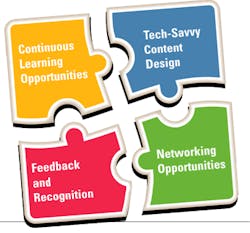Does one size fit all when it comes to training? Is the training program you’re currently implementing Millennial-worthy? These are valid questions you should ask yourself as you invest resources in your organization’s design, development, and implementation of training.
As a trainer, I experience first-hand the difference in training preferences among Millennials, Generation Xers, and Baby Boomers. According to the University of North Carolina’s KenanFlagler Business School, by 2017, over 80% of the workforce will be composed of Millennials – those folks born between 1980 and 1995. This technically savvy generation relies heavily on smart phones, tablets, and laptops to provide instantaneous information from everything to shopping, socializing, research, news, and yes, even training. If your training program isn’t evolving to capture the attention of this generation, you might want to consider the following:1. Millennials are open to change
- Offer different channels for learning such as audio, video, apps
- Offer networking options to help struggling learners
- Use various ways to assess and evaluate before progressing through your training program
- Make sure your company has a plan for continuous learning and support
2. Millennials are task (not time)-oriented
- Offer various training schedules
- Take advantage of training apps so they can assess content, scenarios, and simulators 24 hours a day
3. Millennials want to know why
- Beyond understanding how to perform a task,
- Millennials want to know why they should do it
- 94% are motivated to work harder when they understand the importance of the task within the context of the organization’s big picture goals, and within the parameters of their job
4. Millennials want an opportunity to continue to learn
- Consider offering coaching and mentoring as part of your training program
- Use social media as a key channel for continued learning, and information retention and transfer
- Offer scenarios during and after training that helps them retain information and how the information relates to their job
5. Millennials crave constant feedback
- 80% want to receive regular feedback from their managers
- Provide daily, bite-sized feedback on how they’re doing and ways for improvement
6. Millennials want recognition
- 89% of Millennials said that a reward should be given for a job well done
- Millennials need to know that supervisors and managers approve their work
- They want to know they are successful
7. Millennials want to socialize at work
- Light moments shouldn’t be confused with laziness, lack of professionalism, or goofing off
- Millennials find business value in networking and bonding with teammates, and taking breaks for creative inspiration
- 90% want their workplace to be social and fun
The nearly 80 million Millennials who are about to enter or who are already in the workforce will no doubt change how training is conducted. Ensuring that your organization adapts and changes to meet their training needs and preferences will pay off in the long run with effective programs, practices, and policies designed to attract, develop, and retain this generation. After all, I tend to agree with Peter Drucker – “If you think training is expensive, try ignorance.”
About the Author
Melissa Sease
Certified Master Trainer
Sign up for our eNewsletters
Get the latest news and updates

